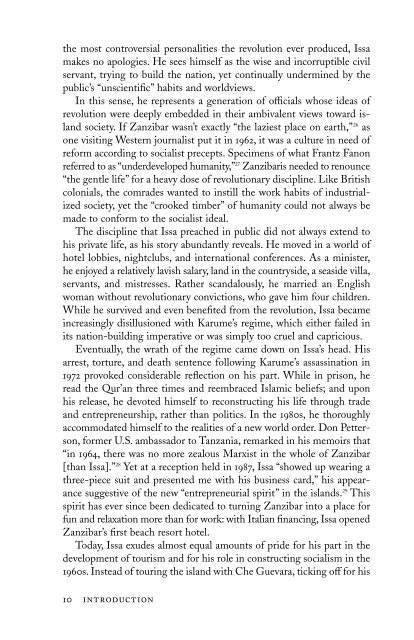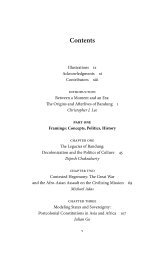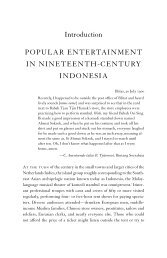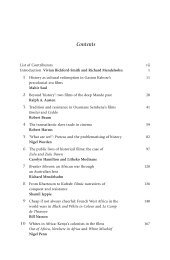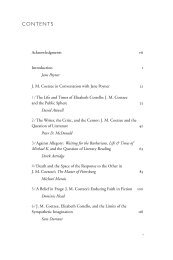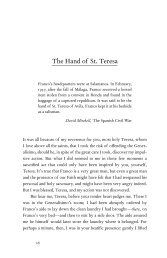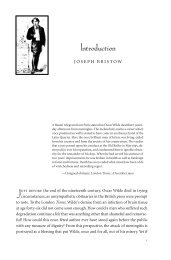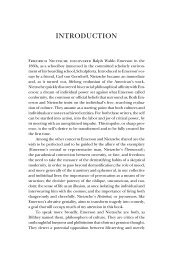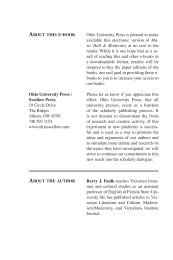Race, Revolution, and the Struggle for Human Rights in Zanzibar ...
Race, Revolution, and the Struggle for Human Rights in Zanzibar ...
Race, Revolution, and the Struggle for Human Rights in Zanzibar ...
You also want an ePaper? Increase the reach of your titles
YUMPU automatically turns print PDFs into web optimized ePapers that Google loves.
<strong>the</strong> most controversial personalities <strong>the</strong> revolution ever produced, Issa<br />
makes no apologies. He sees himself as <strong>the</strong> wise <strong>and</strong> <strong>in</strong>corruptible civil<br />
servant, try<strong>in</strong>g to build <strong>the</strong> nation, yet cont<strong>in</strong>ually underm<strong>in</strong>ed by <strong>the</strong><br />
public’s “unscientific” habits <strong>and</strong> worldviews.<br />
In this sense, he represents a generation of officials whose ideas of<br />
revolution were deeply embedded <strong>in</strong> <strong>the</strong>ir ambivalent views toward isl<strong>and</strong><br />
society. If <strong>Zanzibar</strong> wasn’t exactly “<strong>the</strong> laziest place on earth,” 26 as<br />
one visit<strong>in</strong>g Western journalist put it <strong>in</strong> 1962, it was a culture <strong>in</strong> need of<br />
re<strong>for</strong>m accord<strong>in</strong>g to socialist precepts. Specimens of what Frantz Fanon<br />
referred to as “underdeveloped humanity,” 27 <strong>Zanzibar</strong>is needed to renounce<br />
“<strong>the</strong> gentle life” <strong>for</strong> a heavy dose of revolutionary discipl<strong>in</strong>e. Like British<br />
colonials, <strong>the</strong> comrades wanted to <strong>in</strong>still <strong>the</strong> work habits of <strong>in</strong>dustrialized<br />
society, yet <strong>the</strong> “crooked timber” of humanity could not always be<br />
made to con<strong>for</strong>m to <strong>the</strong> socialist ideal.<br />
The discipl<strong>in</strong>e that Issa preached <strong>in</strong> public did not always extend to<br />
his private life, as his story abundantly reveals. He moved <strong>in</strong> a world of<br />
hotel lobbies, nightclubs, <strong>and</strong> <strong>in</strong>ternational conferences. As a m<strong>in</strong>ister,<br />
he enjoyed a relatively lavish salary, l<strong>and</strong> <strong>in</strong> <strong>the</strong> countryside, a seaside villa,<br />
servants, <strong>and</strong> mistresses. Ra<strong>the</strong>r sc<strong>and</strong>alously, he married an English<br />
woman without revolutionary convictions, who gave him four children.<br />
While he survived <strong>and</strong> even benefited from <strong>the</strong> revolution, Issa became<br />
<strong>in</strong>creas<strong>in</strong>gly disillusioned with Karume’s regime, which ei<strong>the</strong>r failed <strong>in</strong><br />
its nation-build<strong>in</strong>g imperative or was simply too cruel <strong>and</strong> capricious.<br />
Eventually, <strong>the</strong> wrath of <strong>the</strong> regime came down on Issa’s head. His<br />
arrest, torture, <strong>and</strong> death sentence follow<strong>in</strong>g Karume’s assass<strong>in</strong>ation <strong>in</strong><br />
1972 provoked considerable reflection on his part. While <strong>in</strong> prison, he<br />
read <strong>the</strong> Qur’an three times <strong>and</strong> reembraced Islamic beliefs; <strong>and</strong> upon<br />
his release, he devoted himself to reconstruct<strong>in</strong>g his life through trade<br />
<strong>and</strong> entrepreneurship, ra<strong>the</strong>r than politics. In <strong>the</strong> 1980s, he thoroughly<br />
accommodated himself to <strong>the</strong> realities of a new world order. Don Petterson,<br />
<strong>for</strong>mer U.S. ambassador to Tanzania, remarked <strong>in</strong> his memoirs that<br />
“<strong>in</strong> 1964, <strong>the</strong>re was no more zealous Marxist <strong>in</strong> <strong>the</strong> whole of <strong>Zanzibar</strong><br />
[than Issa].” 28 Yet at a reception held <strong>in</strong> 1987, Issa “showed up wear<strong>in</strong>g a<br />
three-piece suit <strong>and</strong> presented me with his bus<strong>in</strong>ess card,” his appearance<br />
suggestive of <strong>the</strong> new “entrepreneurial spirit” <strong>in</strong> <strong>the</strong> isl<strong>and</strong>s. 29 This<br />
spirit has ever s<strong>in</strong>ce been dedicated to turn<strong>in</strong>g <strong>Zanzibar</strong> <strong>in</strong>to a place <strong>for</strong><br />
fun <strong>and</strong> relaxation more than <strong>for</strong> work: with Italian f<strong>in</strong>anc<strong>in</strong>g, Issa opened<br />
<strong>Zanzibar</strong>’s first beach resort hotel.<br />
Today, Issa exudes almost equal amounts of pride <strong>for</strong> his part <strong>in</strong> <strong>the</strong><br />
development of tourism <strong>and</strong> <strong>for</strong> his role <strong>in</strong> construct<strong>in</strong>g socialism <strong>in</strong> <strong>the</strong><br />
1960s. Instead of tour<strong>in</strong>g <strong>the</strong> isl<strong>and</strong> with Che Guevara, tick<strong>in</strong>g off <strong>for</strong> his<br />
10 <strong>in</strong>troduction


